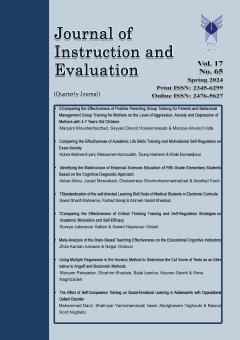Meta-analysis of the effectiveness of brain-based teaching on the indicators of educational cognitive
Meta-Analysis of the Brain-Based Teaching Effectiveness on the Educational Cognitive Indicators
Subject Areas : Research
Zhila kardan halvaee
1
*
![]() ,
negar ostovar
2
,
negar ostovar
2
1 - Department of Educational Sciences, Farhangian University, P.O. Box 14665-889, Tehran, Iran
2 - Assistant Professor, Faculty of Educational Sciences and Psychology, Payame Noor University (PNU), P. O. Box 19395-4697, Tehran, Iran
Keywords: Brain based teaching, Educational cognitive indicators, Meta-analysis, Effect size,
Abstract :
Nowadays, the methods of brain-based education based on the extensive scientific research on how the brain learns, has been mostly considered by many researchers. The numerous and contradictory studies in this subject emphasize the need to conduct meta-analysis. The present study has been conducted by the meta-analysis method and with the aim of combining the conducted research in the field of the brain-based education’s impact on the educational cognitive indicators. The population’s research includes the studies that done in Iran from 1387 to the summer of 1402 and published in the databases as the full text. Based on the inclusion and exclusion criteria, 25 studies and 85 effect size selected that finally after sensitivity analysis and removal of extreme effect sizes, 80 effect sizes entered in the meta-analysis. The results showed that the size of combined effect is 1.08 for the fixed effects model and 1.21 for the random effects model; which both of them were statistically significant. In this research, different types of brain-based teaching methods, multiple outcomes, type of lessons and types of subjects were investigated as qualitative and quantitative moderating variables. The results showed that the size of summary effect size affected by all of the moderating variables. The results of the meta-regression also showed that the effect size is a function of the number of intervention sessions, and the subjects' age and the brain-based teaching is more effective in more sessions and at an early age (primary school). According to the results of the present meta-analysis, providing programs in line with the implementation of brain-based education in the educational system is a necessity that should be considered more.
Todays the brain-based education methods according to the wide scientific research on how the brain learns, has been mostly considered by many researchers. The numerous and contradictory studies in this subject emphasize the need to conduct meta-analysis. The present study has been conducted by the meta-analysis method with the aim of combining the conducted research in the field of the brain-based education’s impact on the educational cognitive indicators. The population’s research includes the studies that done in Iran from 1387 to the summer of 1402 years and published full text in the databases. Based on the inclusion and exclusion criteria, 25 studies and 85 effect size selected that finally after sensitivity analysis and removal of extreme effect sizes, 80 effect sizes entered in the meta-analysis. The results showed that the combined effect size is 1.08 for the fixed effects model and 1.21 for the random effects model which both were statistically significant. In this research, different types of brain-based teaching methods, multiple outcomes, type of lessons and types of subjects were investigated as qualitative and quantitative moderating variables. The results showed that the summary effect size affected by all of the moderating variables. The results of the meta-regression also showed that the effect size is a function of the intervention sessions number, and the subjects' age and the brain-based teaching is more effective in more sessions and at an early age (primary school). According to the results of the present meta-analysis, providing programs in line with the implementation of brain-based education in the educational system is a necessity that should be considered more.

